Not in Bruges anymore, Martin McDonagh and Colin Farrell speak with Patricia Danaher from the Hollywood set of their latest collaboration, the film Seven Psychopaths.
Martin McDonagh appears relaxed during the making of his latest movie. Deeply tanned and grinning broadly, he looks more like a man on holiday than someone directing a big feature film in Hollywood, on a set bedecked with high maintenance movie stars. We meet on the set of Seven Psychopaths, the first movie he’s ever made in Los Angeles and which stars Colin Farrell, Tom Waits, Christopher Walken, Woody Harrelson and Sam Rockwell.
The City of Angels has been kind to McDonagh. He picked up his first Oscar here in 2006 for his first short movie, Six Shooter. His second movie, In Bruges, garnered several major nominations, including a Best Screenplay Oscar nod and it won Colin Farrell his first Golden Globe.
Now, Los Angeles itself is a character in Seven Psychopaths. The film is an action-comedy about a screenwriter (played by Farrell), who inadvertently gets caught up in the criminal underworld of LA after his friends kidnap a gangster’s beloved Shih Tzu, while he’s trying to write a movie called “Seven Psychopaths.” McDonagh is in his element in all senses.
“I love it. It’s been a dream. Just to make one movie was a dream come true, so it really is a kind of joy to be actually making one in Hollywood,” he says, grinning. “I like having towns as characters in a film. In Bruges was obviously that, but I wanted LA to have the same quality that Bruges did for the last one, and hopefully that’s there. There’s a lot of good stuff here.”
Seven Psychopaths was filmed and set in Silverlake, a district of LA synonymous with artists and hipsters. More of the movie takes place in the nearby desert of Joshua Tree, where the characters escape after the madness becomes extreme. McDonagh wrote this movie several years ago, long before he enjoyed the success of In Bruges. He admits freely that he lacked the confidence to make it sooner and wanted to wait until he had more experience under his belt as a director, before taking on Seven Psychopaths.
“I’ve had the script for maybe five or six years. I always liked that I had it before the Bruges script. I always knew that it was bigger than the tools I had six years ago, so I always knew that making Bruges would let me know if I had the capacity to do something bigger, that’s more like a jigsaw. After doing In Bruges, I got the confidence to feel like I’d be able to go for it. In this one, there’s a lot more to get one’s head around in so many ways that there weren’t in In Bruges.”
Although the locale and the majority of the cast are new, this is the second time that McDonagh has collaborated with Colin Farrell, and there is very clear chemistry and ease between the two men both on the set and in person.
“It’s been great working with Colin again. We saw each other in bits and pieces over the past few years, but as soon as we started working together again, it was like having a kind of shorthand with someone. It feels like we’ve known each other a very long time. Hopefully we can match the artistic success of In Bruges with this one.”
And is there any chance of he and Farrell ever collaborating on stage?
“Maybe in a year or two, we might do something on stage, yeah,” he says smiling broadly and trying to be vague. “It would be great fun to try to do something together in the theater. We’ll see.”
McDonagh is also working with Graham Broadbent who produced In Bruges. Much of the funding for this new movie is also coming again from Film Four and British Film Institute, along with CBS Films.
In person, McDonagh is so gentle and calm that it’s at times hard to imagine he’s the same writer who is constantly drawn to dark and violent places.
“I’m quite even-tempered really. I’m never even angry, most of the time. The idea for this movie started with a writer wanting to write about seven psychopaths, so even the script is about that attempt. It’s like a snowball within the story of the script – he gets one, then another, then two more pop up that he didn’t know were already in his life. He wants to write about something he’s seen the other day that’s more about peace and love than it is about violence, and that’s the dichotomy and tension in the story. The Pillowman is in some ways similar to this – stories within stories.
“There are elements of the story that are quite true to me, but there’s plenty that isn’t. It’s fun to throw my truths into the mix with things that are completely alien to me. At the heart of it, I guess, is a writer who has written violent stuff, but who has issues with the whole thing, which is kind of what I do. So there is a truth to it, I guess.”
McDonagh has been a sure-footed writer since he first emerged in the mid 1990’s with the Leenane Trilogy. All his work has gone on to Broadway and he has won multiple Tonys. Although he has relatively few screen credits, his reputation as a writer is such that he had no difficulty casting such major names as Christopher Walken (who played the lead in his last play, A Behanding in Spokane) or Tom Waits. When Mickey Rourke stormed off the movie last December, because of eh, creative differences, Woody Harrelson replaced him in a heartbeat.
“Woody I’d known for some years. We met in Dublin for some reason. Chris Walken, I think all of us looked up to him as kids and just adored him. We worked together in my play a year and a half ago. And Tom Waits I’ve loved since I was kid. When he showed up on the set, we were all going ‘oh my God, it’s Tom Waits!’”
“Tom has a brilliant new album out, and I have to say, it was joyous driving down the streets of LA and seeing Tom’s face advertising his new album and then showing up on set and he’s acting in my movie! It’s kinda crazy. You have to pinch yourself at times like that,” he says, beaming.
For all the glory and glamour that is perceived and projected onto the film industry, McDonagh admits that he finds it absolutely draining, and he has no plans to make another movie for a long time after this one wraps.
“I like going between film and theatre. I’ve never directed theatre, but as the writer, you have 100% control over the script and nothing, not a word, can change without your permission. And I’m always in rehearsals. But the sheer workload of making a film is so different. It’s not so much exhausting, but it occupies every single minute of your time for two years, and the intensity of the filming process is pretty phenomenal.
“I can’t understand why people do one a year, or even one every two years, especially when you really care about it, like I do this one and like I did the last one. It feels like wrenching something from yourself. I don’t get how people can do it more than every three or four years to be honest.”
Could he ever imagine directing someone else’s work?
“Never. It’s hard enough trying to keep the rein of your own. I would never work on someone else’s scripts. Each person has only got a certain amount of stories to tell or degrees of passion with which to tell them, so they would always have to be my own scripts.”
Given that this is his second major feature, I wonder how much the experience of making In Bruges helped him.
“I was a bit more comfortable the first day here, but strangely as it’s gone on, because there is so much more to it, it’s almost more exhausting. That could be because of the city of LA and going out to the desert. In Bruges, we would walk to the set every day and when we wrapped we walked five minutes home. I don’t know how to drive, so that’s a bit tricky in LA!
“There are a few action sequences in this movie, which was new for me and I didn’t like doing them very much. The power is always in someone else’s hands, the stunt people, or the special effects people, which is good in some ways. Good or bad, you can’t do anything about it – it’s either going to crash into that thing or it isn’t, explode or not and there’s no impact you can have on it either way. I prefer stuff like working on a small scene with great actors, listening to what they want to do and trying to help in any way I can. That’s what I would prefer film making to be about. I think there will be less stunts and action stuff in the next one, if I do another one.”
Michael McDonagh, Martin’s older brother, enjoyed some success and recognition himself last year from his anarchic movie, The Guard, which was nominated for a Golden Globe for Brendan Gleeson as Best Actor in a Comedy.
“I’m thrilled for my brother. He’s been writing for years and he inspired me to start writing. It’s great that the floodgates are finally opening for him. I love The Guard. Michael phoned me up at midnight about six or seven months ago saying ‘we’ve just overtaken In Bruges’s box office receipts for an Irish independent movie!’ It was lovely to be a tiny part of its success. We love each other to pieces and there really isn’t any sibling rivalry.”
I let him tell me all this before relating a few stories which Brendan Gleeson told me about how insanely competitive he found the McDonagh brothers, having worked with each of them, and Martin laughs hard at getting caught.
“You’re right, that was complete bullshit!” he laughs. “We’re completely competitive, but more in sports than anything, and then insanely so. We play tennis, but he never wins and he’s always angry about it. I’m always better than him, always! But that’s different to the artistic side. We can be at each other’s throats sportswise, but we each want the other to do brilliantly careerwise.
“We don’t tend to read each other’s work too early in the process. We try to avoid that. We always knew the other one was good. We always had this arrogance or self-belief. We knew we were going to get there individually, so we didn’t need that support so much.”
When Colin Farrell ambles in to talk to Irish America, he clearly has home on his mind. He has just returned from a long-overdue trip back to Dublin and he is feeling a few pangs. His first trip home to Ireland in over a year was to visit his family for Christmas.
He jetted into Dublin shortly before Christmas with his sister Claudine and his eldest son, James, for a week, taking a short break from filming. McDonagh spent Christmas in Galway.
Sporting a short haircut and dressed in a blue v neck t-shirt, Farrell looks relaxed, although he was at work.
“Christmas was magic, really, really magic. I absolutely loved it,” he says. “It was way too quick though. It’s the first time I’ve ever broken for Christmas while doing a job. I had to come back, I was obliged to return to work, otherwise, I’d still be there.”
Christmas arrangements are somewhat more complicated these days, now that he’s the father of two boys, eight-year-old James, who has Angelman Syndrome and whose mother is American former model Kim Bordenave, and two-year-old Henry, whose mother is the Polish actress Alicja Bachleda.
“It was James’s turn this year – we alternate Christmases and I took him [to Ireland] with me. Henry was in Poland.”
The Farrells are a close knit bunch who have been regular visitors to Colin in Los Angeles in the decade or so since he moved here. His sister Claudine moved here to be closer to her brother during his wilder, more self-destructive days.
“I realize how easy it is for the time to go, if I don’t make the effort to go home in April or in August for a week. It’s really easy for the time to go, with work and the kids and all. I won’t let that happen again. It was way too long – a whole year and not to go home, it was too much. My sister Claudine – we experience a good bit of this together in our own individual ways – but the two of us were saying, we’re not going to let a year go by again without going home.”
Colin has lived in Los Angeles since 2000, and the city has provided the backdrop to many of the highs and lows of his life in the past eleven years or so. It was here that he became a huge international star, and it was here too where he almost threw it all away, by giving in to his addictions and demons. Finally, it was also in Los Angeles where he got sober and entered the therapy that brought him back from the edge and allowed him to rehabilitate and salvage his career. It seems as though the City of Angels has at last also started to feel like home to him.
“I bought a house here five years ago and I have two kids here, so of course it’s a home of sorts and I love it. I really do. It’s a complicated town and there’s a massive amount of energy here. There’s great live music, great food and some of the nature here is so amazing. It’s kind of spectacular. The sunsets are amazing – you’ve got the ocean on one side and the desert on the other,” he says.
“As far as nature goes, it’s really beautiful. Going home to Dublin this year, more than any trip there in the past ten years, we were talking more about just the idea of home and what home means.
“I realized that Dublin has a certain capture on my heart that LA will never have. Never. And that’s OK. It’s not supposed to. I don’t feel beholden to Dublin. It’s not like I feel guilty for leaving and all that shit. I just really love it there. The sense of community there is the one thing I kind of miss here. There’s an openness at home, you know. I felt perfect in Ireland or in Dublin, because of the openness and willingness to engage that people have on the streets.
“Maybe it’s because people don’t walk around as much here – they’re in their cars all the time. You don’t bump into people, whereas in Dublin, the f–kers are having conversations on every street corner. It’s hilarious.”
Being back in LA means not only being back with both of his sons, but for now it also means Farrell is working with Martin McDonagh again for the first time since the two of them made In Bruges three and a half years ago. The movie won Farrell his first Golden Globe for Best Actor in a Comedy, and proved that he had some comic chops, which had not been seen before and which he has clearly stated he wants to do more with.
He spent five months of last year in Toronto filming Total Recall and it’s clear when we meet how happy he is to be reunited with McDonagh.
“The one thing any actor will tell you is how nice it is to have a relationship with a director that’s born of trust, or built around trust. I have that with Martin, who I’ve known for ten years now. I can’t remember the first three or four of those years, but the last six, I remember fairly solidly!
“There was a bit of shorthand early on in In Bruges and it was always clear to me what he was looking for. I love his work and his sensibility. I read a decent amount of scripts and Martin’s writing is always so unique, I just fell in love with him as a writer and then as a man,” he says.
“When we met up to talk about Seven Psychopaths, we hadn’t seen each other for two years and it was just so easy, straight away. Martin goes off for months or sometimes years of self-imposed exile from the film industry. After this one, I reckon it will be about another five years!” he jokes.
Given the very evident bromance between the two of them and the numbers of Hollywood actors heading to take parts in Broadway plays, I wonder if Farrell would consider taking to the stage, were McDonagh to write a part for him. He grins broadly at the question, hinting that this is indeed something he would consider.
“I dunno. He’s the boss. I defer to him,” he says, smirking. “I wouldn’t say no to anything Martin was ever doing. I just love working with him. Frankly though, it would scare the shit out of me. Part of me loves the transient nature of working on a film, going to towns and locations I haven’t experienced before. Also, with a film shoot, it’s a ten or twelve week turnaround and you get to have that experience before you’re on to the next thing.
“I don’t know for now, but I’d be open to it. We’ll see. His mind is so great and so particular, it would be interesting to see.
“Right now, in Seven Psychopaths, I’m playing a subsidiary of Martin’s imagination, mixed with elements of his own personality and his struggles as a writer. And of course, he’s got a drinking problem, which is of course a complete fictionalization. He’s also devilishly handsome!”
See more photos from the set of Seven Psychopaths:

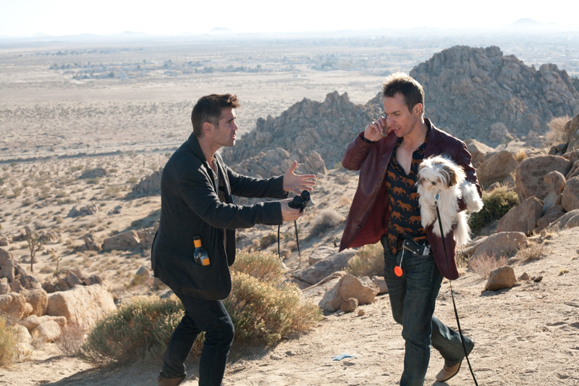

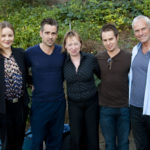
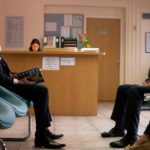
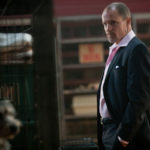
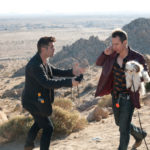
Leave a Reply